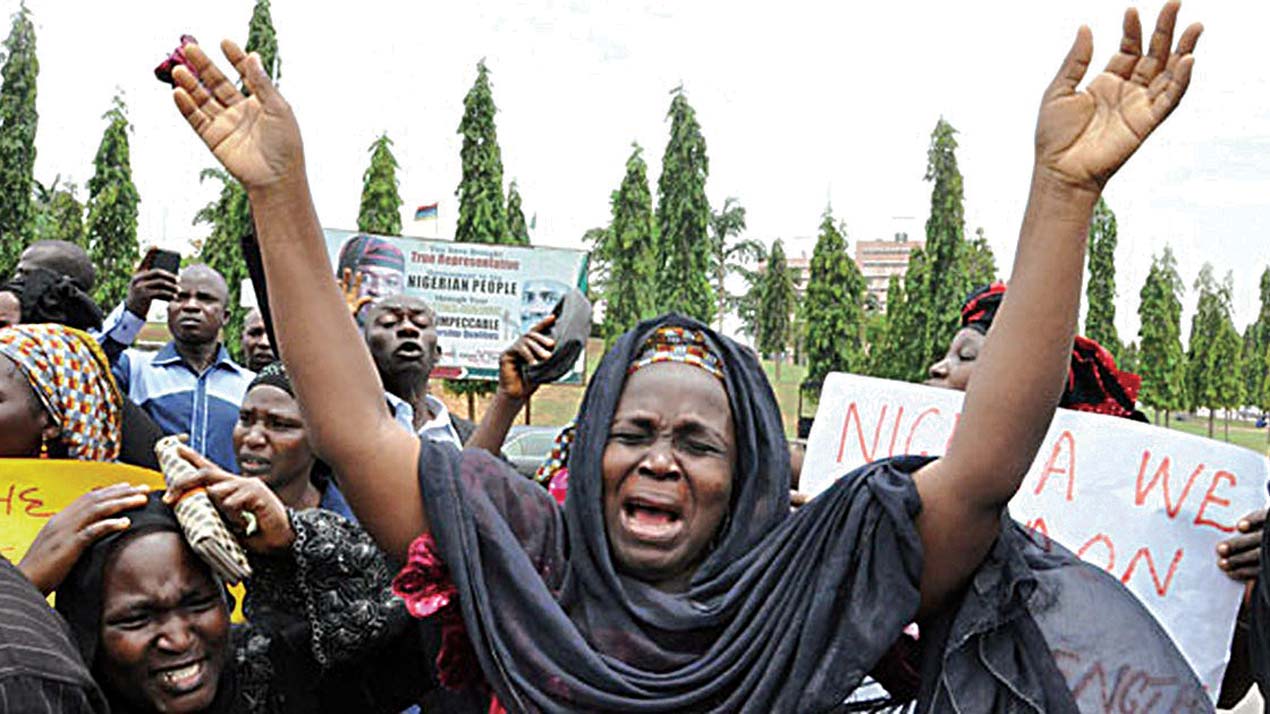The recent abduction of 110 Dapchi female pupils leaves Nigerian schools with more than a sense of déjà vu of the scandalous kidnapping of about 300 girls in a hostel in Chibok. Once again, many parents in the North who beat all odds to send their wards to school are left to rue their choice. More important is the fact that the latest abduction reveals the absence of safety measures in schools, writes Head, Education Desk, IYABO LAWAL
“I saw them with my own eyes. They blocked school gates so we tried to climb over the fence. There were three cars at the gate and they asked us to get in, saying they would help us. Some of us went in and some of us refused. The gunmen shot at the gate and were firing into the air.
“No matter what security is put in place I honestly don’t think I can go back to this school. I have a lot of friends who went missing. At first, I couldn’t go to sleep. I was very much shaken. But I feel better now,” a pupil at the school in Dapchi, in Yobe State, where 110 girls were abducted by Boko Haram terrorists, in an interview with the BBC, described the horror she witnessed.
Now said to be missing by the federal government are 110 girls – the youngest being 11 and the oldest 19. Eight of them were in JSS1; 17 in JSS2; 12 in JSS 3; 40 in SS1; 19 in SS2; and 14 in SS3. Many children in northern Nigeria attend only Quranic schools, where they are taught to memorise and recite the Quran, but not the numeracy, literacy and life skills needed to function effectively in today’s world.
Of the 10.5 million children in Nigeria who are out of school, 60 per cent are in the north, and most of them are girls; and those are the primary target of Boko Haram’s brutal hate campaign against Western education.“We still see resistance to sending children, and particularly girls, to school. This is in part due to mistrust of what is considered Western education. But also a low perception of the value of education and the often poor quality of teaching,” an official of United Nations Children Education Fund (UNICEF), Abdulai Kaikai, had said.
In April 2014, Boko Haram stormed the hostel of Chibok Government Secondary School, Chibok in Borno State and abducted almost 300 schoolgirls who were preparing for their final West African Senior School Certificate Examination (WASSCE)It has become the most dramatic and traumatic kidnapping experience ever known in the world as, to date, negotiations for the release of the girls – though some have been freed – continue.
In November 2016, head teachers from 114 institutions including 100 schools in the Northeast attended a United Nations Educational, Scientific and Cultural Organisation (UNESCO) workshop on security to help them handle the instability caused by extremists of the Boko Haram insurgency, which has been disrupting education in the area.
Participants from primary, junior and senior secondary schools in the three Nigerian states of Adamawa, Borno and Yobe were given 1,350 Safe School kits for their establishments. The kits were developed by a non-governmental organisation, Exam Ethics Marshal International, in collaboration with Nigerian security agencies.
A “safe school programme” was drawn up to provide teachers, parents and students with comprehensive information on safety skills; empower school communities with appropriate guidelines; provide schools with the information and skills required to conduct customised risk and threat audits of their establishments; and, finally, give schools templates for emergency response plans and the establishment of School Emergency Response Teams and Incident Command Systems. Said to have gulped hundreds of millions of naira, the “safe school programme would appear to have failed the Dapchi girls – the latest pawns in the war game of Boko Haram.
For more than eight years, the conflict in the Northeast and the resulting humanitarian crisis is devastating the lives of millions of children, women and their families. With children under 15 years of age accounting for about 45 per cent of the country’s population, the burden on education and other sectors has become overwhelming.
Forty per cent of Nigerian children aged between 6 and 11 do not attend any primary school with the northern region recording the lowest school attendance rate in the country, particularly for girls. Despite a significant increase in net enrolment rates in recent years, it is estimated that about 4.7 million children of primary school age are still not in school.
Increased enrolment rates have also created challenges in ensuring quality education and satisfactory learning achievement as resources are spread more thinly across a growing number of students. It is not rare to see cases of 100 pupils per teacher or students sitting under trees outside the school building because of the lack of classrooms.
The number of schools, facilities and teachers available for basic education remain inadequate for the eligible number of children and youths. This is more so in urban areas where there is population pressure. Under these conditions, teaching and learning cannot be effective; hence the outcomes are usually below expectation. Another challenge is the issue of girls’ education. In the north, the gender gap remains particularly wide and the proportion of girls to boys in school ranges from one girl to two boys to one to three in some states.
Nowadays, many children cannot attend school because of the fear of Boko Haram.Even when children enrol in schools, many do not complete the primary cycle. According to current data, 30 per cent of pupils drop out of primary school and only 54 per cent transit to junior secondary schools. Reasons for this low completion rate include child labour, economic hardship, early marriage for girls, and lately, Boko Haram insurgency.
Despite political commitment to reverse years of neglect in the country’s education sector, investment in basic education is still low compared to other Sub-Saharan countries.Apart from the abduction of the Chibok and Dapchi schoolgirls in Borno and Yobe respectively, schoolchildren in Lagos State have often been favourite and soft targets of militants.
On February 29, 2016, Babington Macaulay Junior Seminary, a school on the outskirts of Lagos was thrown into pandemonium when some schoolchildren were abducted.It was around 8 pm when pupils of the school were busy studying for their upcoming examinations that a gang of 12 armed men struck and kidnapped three schoolgirls. They would later demand for a ransom to release the girls. But in about one week, some of the kidnappers were apprehended and the girls were rescued.It was, however, learnt that was not the first time the school would be threatened by the kidnappers. Some time earlier, the wall of the school had been breached and a pupil abducted.
One of the apprehended gunmen said that the group had previously attempted a kidnap in that same school but were unsuccessful when the girl they abducted managed to escape.Few months later, precisely October 6, 2016, at 7:30 am, some armed men stormed Igbonla Model College in Epe and kidnapped the school’s vice principal, a teacher and four pupils, during the school’s general assembly morning devotion.
Are these abductions happenstances?
A United States of America-trained security expert, Tanwa Ashiru, does not think so.“These successful kidnaps reveal that school (children) kidnaps are fast becoming a trend and a major threat. It is pivotal that the government collaborates with schools to increase policing and protective measures, so as to be better prepared in case of any future attacks. Residences, estates, workplaces located near the waterways or surrounded by heavy forestation are particularly susceptible to these abductions,” Ashiru said in her online post.
According to her, the increasing kidnapping rate both in Lagos and across the country can be viewed as a law enforcement failure, as security operatives have failed to send out a forceful message on the repercussion of such crimes.On January 13, 2017, pupils of the Nigerian Tulip International College (formerly Nigerian Turkish International College), Isheri, Ogun State, was the next school to be attacked by armed kidnappers.Isheri is a border town of Ogun State close to Lagos with waters surrounding the environs.
Through its waters, the gang of kidnappers dug a hole through the school’s fence and gained entry from the back of the NTIC. Upon entry, they fired shots into the air and took away three pupils and five employees of the institution.Oftentimes, kidnapping cases along the waterways are associated with “Ijaw militants” who use speedboats and are adept at navigating the waters. Kidnapping in Lagos is said to persist because the Nigeria Police do not have any counter-kidnapping strategy.
Hard hit by the kidnap menace in its domain, the Lagos State House of Assembly had passed a bill that is expected to curtail the rising cases of the menace. Kidnapping now attracts a death penalty.
“Although passing the bill can be seen as government taking a step in the right direction of tackling kidnapping, a more holistic approach involving tackling socio-economic factors facilitating kidnapping is required to completely eliminate this security threat. Until these aforementioned underlying factors are resolved by the government, the issue of kidnapping will continue to remain one of the biggest security challenges in Nigeria,” Ashiru noted.With the latest kidnap of Dapchi schoolgirls, sending children to school in the north will be seen by many parents as walking a tight rope.
In recommending what should be done to forestall future kidnap, Ashiru said, “Students need to be taught on how to respond in case of emergencies. The schools also need to increase their security arrangement to make them less attractive targets. Having well-lit compounds at night and the use of solar-powered CCTV cameras could be beneficial.
“Unarmed security guards within the premises should have periodic drills and have the ability to quickly contact the nearest police response team at all hours of the day and armed security operatives can carry out random patrols and inspections outside the school walls to ensure there have been no recent breaches.”A retired colonel, Mr Hassan Stan-Labo blamed the Dapchi kidnapping on the failure of intelligence not just on the part of the security agencies but of citizens participation. He said terrorism is intelligence driven. “It is expensive and it calls for greater citizens participation”, he added.
Executive Director, Centre for Human Rights and Conflict Resolution (CHRCR), Idris Abdul, described it as a national embarrassment, and blamed the federal and state governments for leaving the girls vulnerable.He said “I expected that the government must have learned from what happened in Chibok by providing adequate security for the girls in the school. He urged Governor Gaidam to intensify efforts by providing adequate security for all schools, especially the female institutions in the state. With the latest kidnap of Dapchi schoolgirls, sending children to school in the north will be seen by many parents as walking a tight rope.
Guardian

































































